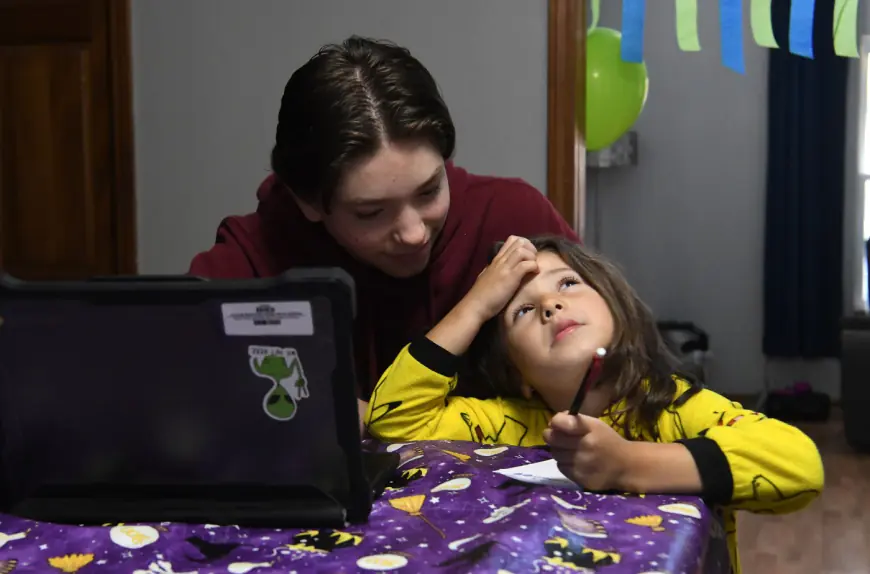Lake Station school referendum looms large for voters with busing on the line
Hamilton Elementary second-grader Orlando Perez stares intently at his Chromebook screen as teacher Krystal Sorensen provides instructions for his next class, physical education. Orlando is in his aunt Mellody Grant’s Lake Station kitchen along with her two older children, Evan and Brayden Grant. The teens attend Edison Middle/High school. While other Indiana students are in classrooms each day, about 1,140 Lake Station students spend Tuesdays and Thursdays at home in front of laptops because Lake Station can’t afford to bus them to school five days a week. Voters can send the students back if they support the district’s bid for the renewal of an eight-year $1.38 million annual operating referendum.

Hamilton Elementary second-grader Orlando Perez stares intently at his Chromebook screen as teacher Krystal Sorensen provides instructions for his next class, physical education.
Orlando is in his aunt Mellody Grant’s Lake Station kitchen along with her two older children, Evan and Brayden Grant. The teens attend Edison Middle/High school.
While other Indiana students are in classrooms each day, about 1,140 Lake Station students spend Tuesdays and Thursdays at home in front of laptops because Lake Station can’t afford to bus them to school five days a week.

Voters can send the students back if they support the district’s bid for the renewal of an eight-year $1.38 million annual operating referendum. Busing eats up about $484,000 of the referendum money, officials said. About $700,000 would be spent on teacher pay, recruitment and academic programs.
A similar referendum failed last year by 14 votes. That loss led to teacher and staff layoffs, including all the district’s paraprofessionals who help teachers in the classroom. It also gutted gifted and talented and STEM programs. The paraprofessionals returned recently because the district used its federal Title I money to pay them.
This year, a new state law backed by GOP lawmakers, calls for districts to share referendum revenue with charter schools that serve students in the district. That means Discovery Charter School in Porter and Neighbors New Vistas High School would each receive $13,317 annually if the referendum passes.

If voters back the referendum, Superintendent Thomas Cripliver said five-day-a-week busing could resume in November, returning students to school full-time.
If the referendum fails, busing would be eliminated next year, challenging the viability of the small district.
Mellody Grant, an urgent care nurse who works three 12-hour shifts a week, said she’s gained a new admiration for teachers as she monitors the hectic school day for three children. She posted a chart on the kitchen wall to remember the online classes for each child.
“Do you have to go potty?” she asks Orlando when his teacher announces a break in classes.

“I praise teachers all the time. I think it’s exhausting,” she said. “You can’t blame the teachers who leave.”
Grant is optimistic the measure will pass this time, and she hopes some departed teachers return, if it passes.
The referendum has the support of Lake Station Mayor Bill Carroll and the city council. Two school board members who abstained from supporting the referendum last year aren’t running for re-election.

The district has scheduled a second community forum to detail referendum spending at 6 p.m. Monday in the community room at Edison Jr.-Sr. High School.
Cripliver makes a point of telling taxpayers that state property tax caps have cost the district $7.4 million since 2019 and state laws and funding cuts have hindered Lake Station from sustaining itself.
Despite confusing wording on the Nov. 5 ballot, Cripliver said a “yes” vote would just renew or extend the existing referendum, passed in 2017.

“We aren’t asking for more money,” he told the city council Oct. 10.
Cripliver said he’s feeling more positive this year as “vote yes” yard signs, featuring yellow school buses, dot the city.
“We have more volunteers helping with the campaign,” he said. “More people, especially parents, are aware of the need for the referendum. Although some of our senior citizen population and adults with no ties to the school district don’t know about the referendum, we are going door-to-door talking to registered voters and getting the word out.”
Meanwhile, freshman Evan Grant, 14, sits in his kitchen and talks about his dream of becoming a police officer.
He was supposed to be in his online world history class, but his teacher quit last month for a job in another district.
“There’s no class for now,” said Evan who said his substitute teacher offered a movie to watch. “I wouldn’t say it’s a bummer. It gives me time to work on other things.”
Evan said his choir teacher also quit “so that’s mostly a free period.”
Younger brother Brayden, 13, said math online can be frustrating and he would prefer to be in a classroom.
“It’s tough to learn math on a small screen,” echoed Mellody Grant.
Evan said his friends and teammates on the football team want the referendum to pass so they can return to school five days a week like their peers in other communities.
The referendum has also led to a lesson in civic responsibility.
“The ones who are 18 are voting,” Evan said of his friends who support the referendum.
Carole Carlson is a freelance reporter for the Post-Tribune.
What's Your Reaction?









































































































